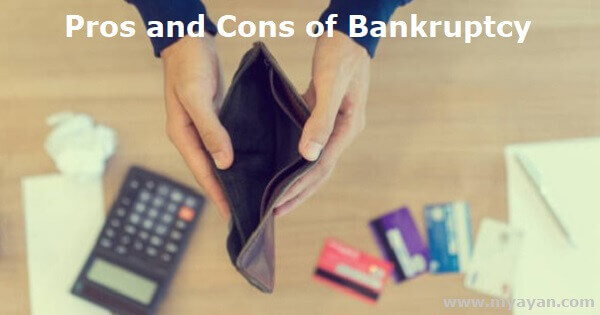Chrysler, Texaco, Enron Corp., and Refco are some big US companies that went bankrupt in recent years. So, what is bankruptcy? Bankruptcy is a legal status of a person or organization that cannot repay debts to creditors. In most jurisdictions, bankruptcy is imposed by court order, often initiated by the debtor. There are both pros and cons of bankruptcy for debtors and collectors.
For debtors, there are several pros of bankruptcy. One of the most significant advantages is that the debtor is protected from creditors. Some major ones are listed below in detail.
When a debtor files for bankruptcy, an automatic stay is put into place. This prohibits creditors from harassing the debtor, calling them, or sending letters. In some cases, the automatic stay can also stop a foreclosure or wage garnishment.
Certain assets are exempt from bankruptcy proceedings. This means the debtor gets to keep them even after filing for bankruptcy. Exemptions vary from state to state, but they usually include a certain amount of equity in a home, personal belongings, and retirement accounts. Having custody of your assets is one of the major pros of bankruptcy.
When a debtor files for bankruptcy, their assets are sold, and the money is used to pay off creditors. However, there are often not enough assets to pay all of the creditors in full. This is called a discharge of debt.
When a debtor files for bankruptcy, they only have to deal with one creditor – the trustee. The trustee is the person appointed by the court to oversee the bankruptcy proceedings. All other creditors are prohibited from contacting the debtor.
If you go bankrupt, there's a good chance that any court action relating to your bills will be dropped. This covers everything from CCJs to formal court judgments.
If you're a sole trader and go bankrupt, your business might have to close down. But bankruptcy won't affect your business partners if you're in a partnership or you run a limited company.
After a debtor is discharged from bankruptcy, they are relieved of their debt and can start fresh. This allows them to rebuild their credit and finances.
There are also several cons of bankruptcy for debtors. One of the most significant disadvantages is that the debtor's credit rating will be negatively affected. This can make it challenging to get a loan in the future. Other disadvantages include the following:
Certain types of debt cannot be discharged in bankruptcy. This includes student loans, child support, and alimony.
In some cases, the debtor may have to give up certain assets to pay off creditors which is among many cons of bankruptcy.
The bankruptcy process can be complex and time-consuming. It is essential to consult with an attorney before filing for bankruptcy.
Your bankruptcy will be recorded in financial papers, the Gazette, and the Insolvency Register, as well as by your friends and family if they are looking for information on you. It's doubtful that it'll show up in your local newspaper.
Some sectors, however, forbid bankrupts from working there. Working as an insolvency expert, financial advisor, or in other professions such as law enforcement or government work are just a few examples. Check your employment contract before applying for bankruptcy to see whether you're affected.
Conclusion
Bankruptcy is a serious decision that should not be taken lightly. It can relieve overwhelming debt and help you get a fresh start, but it also has consequences. Before deciding, weigh the pros and cons of bankruptcy carefully and consult with an attorney who can help you make the best choice for your unique situation.

The most significant advantage of bankruptcy is that it gives the debtor a fresh start. The debtor is relieved of their debt and can start fresh. This allows them to rebuild their credit and finances.
The most significant disadvantage of filing bankruptcy is that the debtor's credit rating will be negatively affected. This can make it challenging to get a loan in the future. Other disadvantages include the following:1. The debtor may have to give up certain assets 2. The debtor may have to pay taxes on the forgiven debt. 3. The process can be complicated and time-consuming.
Unfortunately, bankruptcy is sometimes the best solution for individuals and firms. While it will harm your credit and reputation, bankruptcy is a lawful method of preventing the most severe scenario. If your debts become too overwhelming to manage, you might be forced to liquidate all of your assets and legal judgments for non-payment or breach of contract as a last resort.
If you cannot repay your debts and your assets are at risk of being seized by creditors, you may consider filing for bankruptcy. Bankruptcy can be difficult, but it may be the best option if you face severe financial difficulties. You should consult with an attorney before making any bankruptcy decisions.